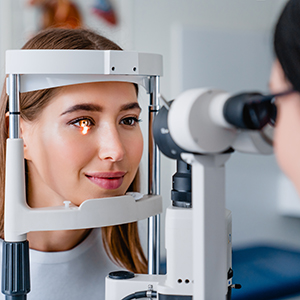
Vision Screening
Diabetes and Eye Health
People with diabetes are at increased risk for vision loss. Managing your diabetes and getting routine eye exams can help protect your eyes.
Why you need an annual retinal eye exam
Over time, having too much sugar in your blood can damage your eye, causing a condition called retinopathy that can lead to blindness. There’s good news though—retinopathy is preventable. If you have diabetes there are important steps you can take to prevent vision loss and maintain good eye health:
- Get a comprehensive dilated eye examination every year
- Manage your blood sugar
- Maintain healthy blood pressure and cholesterol levels
- Quit smoking
- Exercise regularly
What to expect during your screening

Your retinal eye exam appointment will probably be very similar to other trips you’ve made to the eye doctor. They will ask questions about your medical and vision history and ask you to read an eye chart. Then, your doctor will use drops to dilate your pupils and examine your retinas.
You may want to arrange for someone to drive you home, since it can take 4-6 hours for your eyes to go back to normal after being dilated. Schedule your appointment near the end of the day so you don’t have to go back to work.
If your doctor is concerned you may have severe retinopathy, they may run an additional test called a fluorescein angiogram. For this test, your doctor will inject a fluorescent dye into your bloodstream. The dye highlights your blood vessels in the back of the eye so they can be photographed and examined.
If your doctor observes retinopathy
If your doctor observes early-stage retinopathy, they will likely have you come back every few months for repeat dilated eye exams to monitor you.
In later stages of retinopathy, they may recommend immediate treatment, especially if you are experiencing changes in your vision. There are a variety of different treatment options, that might include injections of medication, laser treatment, or potential surgery. Your doctor will discuss treatment options that will best manager your case.
Make an appointment
There are different types of eye specialists. People with diabetes should have a retinal eye exam from an optometrist or an ophthalmologist. Additional vision insurance is often not needed to cover the cost of the visit. Most medical insurance plans cover retinal eye exams for individuals with diabetes.
Pregnant women with diabetes should be monitored more closely, due to the potential for pregnancy to aggravate retinopathy. Retinopathy screening is often recommended at the beginning of pregnancy and 1-2 more times depending on the individual. Talk with your doctor about what frequency is right for you.
If you don't already have an eye doctor, click here to see specialists in your area (under specialty, select ophthalmology) or call 231-935-0951.
Warning signs
If you have sudden blurred vision, black spots, or flashing lights in your field of vision, those are warning signs that you should call your eye specialist right away.